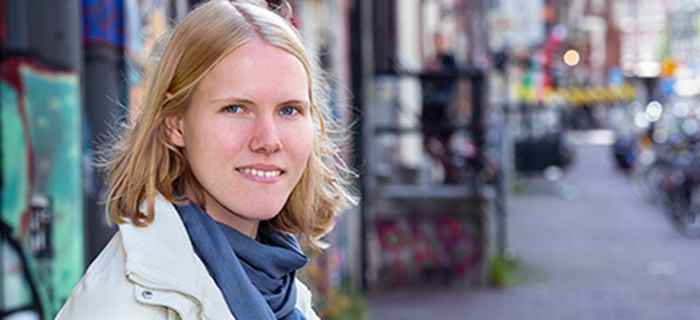Katya Buts

Educational background
In 2013 I graduated with a Bachelor's in Linguistics, with a specialisation in Sign Linguistics and an extracurricular minor in Psycholinguistics from the department of Psychology at the University of Amsterdam (UvA).
Why General Linguistics?
I really appreciate the opportunity to combine several interests in the Master’s programme. Linguistics is a broad field with many interesting sub-fields. Because of my special interest in sign languages and sign linguistics, I was looking for a Master’s programme that would allow me to take courses in this area of expertise. I am fascinated by both the linguistic (research) part and the cultural aspects that come with expertise in this area. Furthermore, in both sign linguistics and clinical linguistics there is a need for further research, as well as for current academic knowledge to be applied in clinical and other practical settings to help people with language problems. I think the field is very interesting and important, and I would like to contribute to it.
Why this Master’s at the UvA?
I really enjoyed an interesting Bachelor's in (Sign) Linguistics at the University of Amsterdam, where a team of renowned and devoted linguists forms the department of Linguistics. Because of the pleasant environment created in this department and my strong interest in the clinical and psycholinguistics facets of linguistics, I chose to pursue an Master's in General Linguistics with the track Clinical Linguistics, also at the UvA. I also wanted to continue taking courses in Sign Linguistics, which is possible in the broad Master's programme in General Linguistics at the UvA. This programme gives participants the freedom to choose their own area of specialisation. Furthermore, it is possible to do an internship within the specialisation of Clinical Linguistics, which is of great value in addition to the theoretical courses offered by the Master's.
Any tips for new students?
Make sure you choose an area of expertise within the Mater's in General Linguistics programme that you are very interested in. That will make it fun and easy to participate in lectures and discussions in class. Also, make sure you are critical and inquisitive about everything the programme and teachers have to offer and do not hesitate to question everything you run into.
Take the opportunity to do an internship within the track Clinical Linguistics. It gives you the chance to observe and learn how linguistics, especially clinical linguistics, is used in actual practice and it provides a perspective on future possibilities for you as a professional linguist.
Any other projects/extracurricular activities?
In my spare time I like to engage in sports, in particular competitive
swimming and squash. I am also a student member of the Board of Studies and I
just started a second internship in the research department of Sign Linguistics
at Radboud University Nijmegen.
Furthermore, I am a volunteer on an ongoing research project gathering
information about the fate of Jewish deaf people and their families in Holland
during the Second World War.
Plans after graduating?
Last February I started a second Master’s programme in Dutch as a Second Language. After graduating from both Master’s programmes, I hope to be able to combine my interests in clinical linguistics, sign linguistics and Dutch as a second language, and to apply my acquired knowledge in practice to help people.